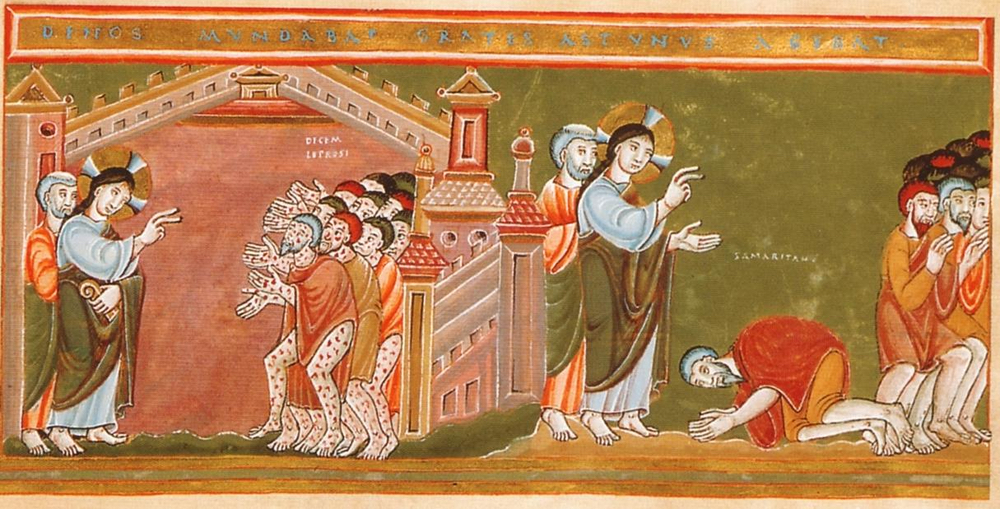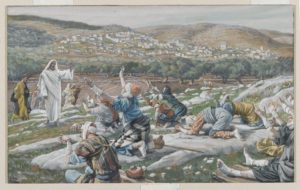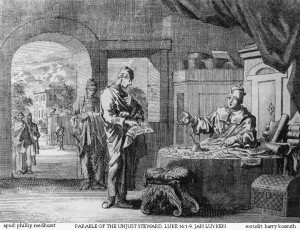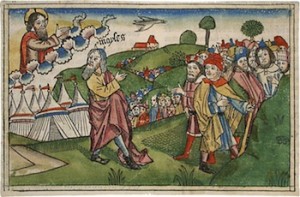Illuminations on the Lectionary readings for Oct. 12, 2025 (Pentecost 18C/Proper 23)

Cleansing of the ten lepers (c. 1035-1040), in the Codex Aureus Epternacensis, an 11th-century illuminated Gospel book now housed at the Germanisches Nationalmuseum in Nuremberg, Germany. (Click image to enlarge.)
First Reading (Track One): Jeremiah 29:1, 4-7
Trust in God! Whether our lives are going well or whether things are going badly, trust and be thankful for God’s blessings. Hear this consistent theme through Sunday’s readings. We begin with the Prophet Jeremiah, who in recent weeks we have heard weeping in anguish over the loss and destruction of Jerusalem and its temple. He now dries his tears, and, speaking on God’s behalf, offers practical advice to the people in exile: Recognize your new reality. God has sent you here, so live, love, and flourish here. Babylon is your city now, and you have a stake in its condition. But don’t forget God, and don’t forget Jerusalem. Even in exile, don’t forget to pray.
First Reading (Track Two): 2 Kings 5:1-3, 7-15c
In this passage from the Second Book of Kings, we meet Naaman, a proud commander of the Aramean army and a mighty warrior. Despite his high status, Naaman had contracted leprosy, a disfiguring disease that would cost him both his military rank and his high status in society. Although Aram was Israel’s enemy, Naaman took an Israelite maid’s advice: Go to Israel and ask the Prophet Elisha for a cure. When Nathan arrived, Elisha wouldn’t even see him, but simply sent a servant to tell him to bathe in the Jordan. This measure sounded too simple to be true. Naaman was beyond angry, but his servants urged him to give it a try. Behold! Naaman was cured! And through his cure, he found faith in Israel’s God.
Psalm (Track One): Psalm 66:1-11
This portion of Psalm 66 might appear to be in a familiar genre, a hymn of praise for God’s glory, power, and awesome deeds. It describes God’s mighty works in the Exodus: God led the people out of Egypt, through the Red Sea, and toward the Promised Land. But then in verses 10 and 11, its narrative takes an unexpected turn: God doesn’t only lead us but tests us, too. We may groan under burdens, as Judah groaned in exile. Yes, even God’s own people may be defeated. They may suffer fire and flood. But after it all, God will bring them out to a place of refreshment.
Psalm (Track Two): Psalm 111
The Psalms, the hymnal of the ancient Temple, consist of many genres, from lament to complaint to petition to thanksgiving and praise. In Psalm 111, we hear a powerful song of praise and thanksgiving. We applaud God’s many acts of power and majesty, righteousness, and justice; and at the end, we sing our praise and gratitude for God’s gifts. All who practice wisdom have a good understanding of God, the psalm proclaims; all the wise are in awe of what God has done.
Second Reading: 2 Timothy 2:8-15
The young, growing Christian movement faced frightening persecution by the Romans when this letter was written near the end of the first century in the names of Paul and Timothy. These verses contain a strong call to faith. Recalling Paul’s suffering in chains in prison and facing death, the writer reminds us that God’s word cannot be held in chains. Remembering the death and resurrection of Jesus, we are reminded that, through we die with Jesus, we live in Christ.
Gospel: Luke 17:11-19
Judeans and Samaritans were once united in faith, but centuries of exile, rivalry, and differing religious traditions turned them into rivals and even enemies. The Gospels aren’t shy about showing this prejudice. Jesus, however, often flips the script by portraying specific Samaritans as good neighbors, most notably in the parable of the Good Samaritan. Sunday’s Gospel shows us another: Jesus heals 10 lepers without touching them: He simply tells them to go to the priests; but as they start off, all 10 are suddenly healed! Nine continue happily on their way, but the one who comes back, loudly praising God, is a Samaritan. “Get up and go on your way,” Jesus tells this foreigner. “Your faith has made you well.”



